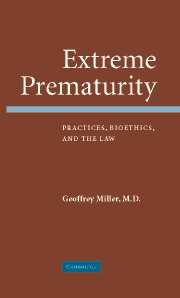Book contents
- Frontmatter
- Contents
- Part 1 THE EXTREMELY PRETERM INFANT: EPIDEMIOLOGY, PERCEPTIONS, AND PRACTICES
- Part 2 BIOETHICS
- 14 Moral Theory
- 15 Autonomy
- 16 Beneficence and Nonmaleficence
- 17 Justice
- 18 Sanctity of Life
- 19 Active and Passive Euthanasia
- 20 Personhood
- 21 Quality of Life and Best Interests
- 22 Futility
- Part 3 REPORTS, OFFICIAL OPINIONS, AND GUIDELINES
- Part 4 THE LAW
- Part 5 EPILOGUE: TRUTH, TRUST, AND BOUNDARIES
- References
- Index
21 - Quality of Life and Best Interests
Published online by Cambridge University Press: 23 September 2009
- Frontmatter
- Contents
- Part 1 THE EXTREMELY PRETERM INFANT: EPIDEMIOLOGY, PERCEPTIONS, AND PRACTICES
- Part 2 BIOETHICS
- 14 Moral Theory
- 15 Autonomy
- 16 Beneficence and Nonmaleficence
- 17 Justice
- 18 Sanctity of Life
- 19 Active and Passive Euthanasia
- 20 Personhood
- 21 Quality of Life and Best Interests
- 22 Futility
- Part 3 REPORTS, OFFICIAL OPINIONS, AND GUIDELINES
- Part 4 THE LAW
- Part 5 EPILOGUE: TRUTH, TRUST, AND BOUNDARIES
- References
- Index
Summary
Is it true that the life of an individual with a severe disability may be so difficult for that individual that should the opportunity arise, during early infancy, to extinguish the possibility of that life, taking that opportunity is a morally good act and not a morally harmful one? In the best interests argument it is held that treatment for a severely disabled infant should be such that it is based on a reasonable assessment that its benefits outweigh its burdens. In this approach there is an acknowledgment that there is a balance to be struck between the value of an infant's life, and “a life that, on balance, does not warrant aggressive treatment.”(211) The proposal is that treatment of certain infants harms their interests. How can we judge this for infants who are unable to express their interests? It is clear that some severely disabled infants endure painful surgical interventions, and medical complications, that are performed and managed to improve, as well as sustain, their lives. In terms of the interests of such infants, is the endeavor worth the outcome? It is not the act that is morally indefensible, as we allow medical and surgical interventions to be performed on others, and attempt to alleviate their pain and maximize their outcome. Is it, then, the outcome that is nonbeneficial? That is life as a severely disabled individual. The argument cannot be sustained for the majority of disabled infants who will live lives of sentience and individual significance.
- Type
- Chapter
- Information
- Extreme PrematurityPractices, Bioethics and the Law, pp. 80 - 85Publisher: Cambridge University PressPrint publication year: 2006



